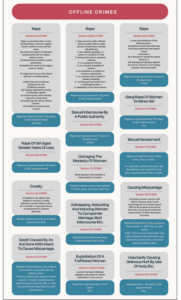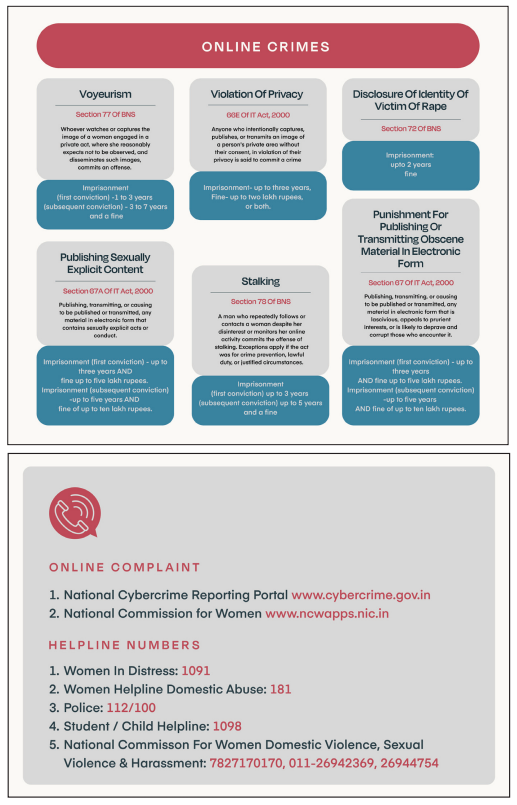MUMBAI: According to the National Crime Records Bureau (NCRB), 445,256 cases of crimes against women were reported in 2022. This number underrepresents the true scale of the problem due to significant underreporting. Many crimes against women go unreported or are hardly reported at all due to several factors.

In recent years, India has witnessed significant changes in its legal framework to address crimes against women and enhance the justice delivery system. By understanding these processes, women can be better equipped to navigate the legal system and pursue justice effectively.
According to the National Crime Records Bureau (NCRB), 445,256 cases of crimes against women were reported in 2022. This number underrepresents the true scale of the problem due to significant underreporting. Many crimes against women go unreported or are hardly reported at all due to several factors:
1. Social stigma and shame
2. Fear of retaliation or further violence
3. Lack of faith in the system
4. Family pressure to maintain reputation
5. Economic dependence on the perpetrator
6. Limited awareness of legal rights
7. Inadequate support systems for victims
8. Cultural norms that normalize certain forms of violence
As a result, the official statistics likely represent only a fraction of the actual incidents occurring. This underreporting masks the true extent of crimes against women in India and can hinder efforts to address the issue effectively.
REPORTING A CRIME: FILING AN FIR
The first step in seeking justice is to report the crime by filing a First Information Report (FIR). Under Section 173 of the Bharatiya Nyaya Sanhita (BNSS), 2023, the following provisions apply:
FIRs for cognizable offenses must be registered without delay by the officer in charge of a police station.
For specific offenses against women (Sections 64-71, 74-79 and 124 of BNSS), the FIR must be recorded by a female police officer. Request a female police officer’s presence. It must be videographed.
Victims or informants are entitled to a free copy of the FIR immediately. Obtain a free copy of the FIR for your records.
FIRs can be lodged at any police station across the country, regardless of jurisdiction. If faced with reluctance from local police, you can file an FIR at any police station. One may also submit the information in writing by post to the Superintendent of Police as safeguarded by Section 173.
Section 173 allows electronic filing of FIRs, with the requirement of obtaining the informant’s signature within three days.
Victims can file complaints anonymously for sensitive issues like online child pornography, sexually explicit content and rape or gang rape through National Cyber Crime Reporting Portal.
STATEMENT RECORDING AND INVESTIGATION
The BNSS introduces several victim-centric provisions for statement recording and investigation:
For offenses under Sections 64-71 dealing with rape, Section 74-79 pertaining to sexual assault and outraging the modesty of the woman, and Section 124 in relation to acid attack, statements must be recorded by a woman Magistrate or a male Magistrate in the presence of a woman as per Section 183 of BNSS.
Statements of mentally or physically disabled women and children should be recorded in the presence of a special educator or interpreter, preferably at their residence or a convenient location as mentioned in Section 173 of BNSS. Ask for the presence of a special educator or interpreter if needed.
Video recording of statements is mandated to ensure accuracy. Insist on video recording of your statement.
Investigating officers must visit the crime scene immediately and collect all relevant evidence. The Senior Deputy Police Officer (SDPO) is required to closely supervise the investigation.
Stay informed about the progress of the investigation (mandated every 90 days) as per section 193 of BNSS.
MEDICAL EXAMINATION AND EVIDENCE COLLECTION
In cases of sexual assault/rape:
The woman must be sent for examination within 24 hours of receiving information about the offence. Request for a female medical practitioner to conduct the examination.
Section 184(6) of BNSS mandates medical practitioners to send the medical report to the investigating officer within 7 days. Ask for a copy of the medical report for your records
Forensic experts should be called to the crime scene for offenses punishable by seven years or more.
LEGAL PROCEEDINGS AND FAST TRACK COURTS
To expedite justice, Fast Track Special Courts (FTSCs) have been established for matters pertaining to sexual offences against woman involving rape and violations under POCSO Act, 2012:
As of May 2024, 755 FTSCs, including 410 exclusive POCSO Courts, are functioning across 30 states and UTs.
These courts aim to complete trials within one year.
Special provisions exist for child victims under the POCSO Act, 2012.
PROTECTION AND SUPPORT SERVICES
Various mechanisms are in place to protect and support victims:
Apply for witness protection if you feel threatened. Witness Protection Scheme, 2018, provides security to victims and witnesses.
Request free legal aid if you cannot afford a lawyer. District Legal Services Authorities offer free legal aid.
Seek support from One-Stop Centers for counseling, medical aid and legal assistance. One-Stop Centre Scheme 2015 by the Ministry of Women and Child Development (WCD) addresses Gender-Based Violence to facilitate access to a wide range of services to women affected by violence.
CONCLUSION
The legal landscape for addressing crimes against women in India has evolved significantly, with a focus on victim-centric approaches and speedy justice. The recent reforms, including the consolidation of offenses under the Bharatiya Nyaya Sanhita, 2023, demonstrate a commitment to prioritizing women’s safety. However, the effectiveness of these measures will depend on their implementation and the broader societal changes needed to challenge deep-rooted patriarchal norms. Women seeking justice should be aware of their rights, the procedures in place and the support systems available. By understanding these aspects, victims can navigate the legal system more effectively and increase their chances of obtaining justice.
Remember, seeking justice can be a challenging process, but you are not alone. Stay informed, assert your rights and don’t hesitate to seek help when needed.
By addressing both the symptoms and root causes of violence against women, India can hope to build a future where every woman feels secure and empowered to seek justice without fear or hesitation.
Khushbu Jain is a practicing advocate in the Supreme Court and founding partner of the law firm, Ark Legal and assisted by Shradha Rajoria and Aditi Sinha interning at Ark Legal.

